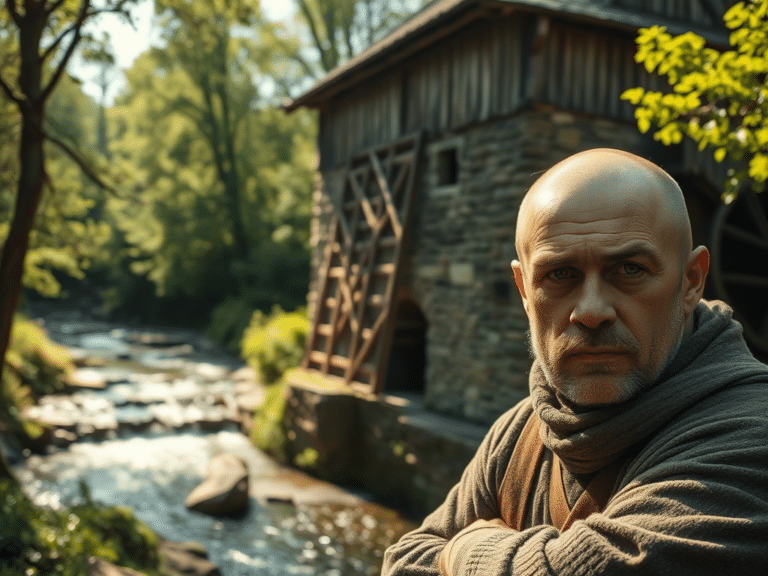The Forgotten Ledger
The Lost Village
Deep within the misty hills of an unnamed country, there lay a village that had been forgotten by time. Its name was lost to the wind, and its people, isolated from the world, had grown accustomed to their solitude. The village was surrounded by a thick forest, a labyrinth of trees so old and twisted that sunlight rarely reached the forest floor.
Few travelers ventured into the forest, for the path was treacherous and easy to lose. Those who did often returned with stories of strange sounds and fleeting shadows, though none could ever recall precisely where the village was. They described it as a place that seemed to shift, never quite in the same place twice.
One cold autumn evening, a scholar named Elias stumbled upon the village while researching local folklore. Elias was a man of logic, not prone to superstition, yet he could not help but feel a sense of unease as he crossed the village’s threshold. The air here felt heavy, laden with an almost tangible history, and the villagers themselves were quiet, their eyes filled with something Elias couldn’t quite place.
The village was small, with perhaps thirty or forty residents. They lived in modest stone cottages with thatched roofs, surrounded by fields of wildflowers that seemed to glow in the dim light. The village square, if it could be called that, was little more than an open space with a well in the center. There were no shops, no taverns, nothing to indicate that this place had ever been connected to the outside world.
Elias, curious about the village’s history, inquired with the elder, a stooped man named Geralt. The elder spoke slowly, as if each word carried great weight.
“We have lived here for as long as anyone can remember,” Geralt said, his voice raspy. “Our ancestors came here to escape the troubles of the world. They sought peace, and they found it.”
“Yet,” Elias pressed, “surely there is more to your story. Your village is unlike any I have encountered.”
Geralt’s eyes narrowed slightly. “The past is best left undisturbed, scholar. We are a simple people, and we prefer it that way.”
Disappointed but not deterred, Elias continued his research, making notes in a leather-bound journal he always carried. He observed the villagers, noting their routines and interactions. They seemed to live in harmony, but there was an underlying tension, something unspoken that bound them together.
Elias began to notice small, strange details. The villagers never spoke of their ancestors by name, and there were no graves or markers to indicate where the dead had been buried. The children were eerily quiet, their laughter absent from the village, and at night, Elias heard faint whispers carried by the wind, though he could never find their source.
The Hidden Chamber
Determined to uncover the truth, Elias spent his days exploring the village and the surrounding forest. One afternoon, he ventured into the elder’s cottage, under the pretense of seeking more information about the village’s history. Geralt was not there, and the cottage was empty.
Elias’s curiosity got the better of him, and he began to search the elder’s home. He found little of interest until he noticed a trapdoor beneath a threadbare rug. With a glance over his shoulder, Elias lifted the door and descended a narrow staircase into a dark cellar.
The cellar was small and musty, filled with old crates and forgotten items. But what caught Elias’s attention was a large, ornate chest in the corner, covered in dust. The chest was locked, but the lock was old and rusted. A few sharp tugs, and it snapped open.
Inside the chest was a collection of ledgers, each one meticulously detailed. They recorded the lives of the villagers, births, marriages, and deaths, but the entries were strange. The names seemed to repeat across the generations, as if the same people had been living in the village for centuries.
Elias felt a chill as he read further. The ledgers described rituals, ceremonies held in the dead of night, where the villagers would gather in the forest, chanting in a language Elias did not recognize. The rituals were meant to appease something, though the entries were vague on what that something was.
The last entry in the ledger was from fifty years ago, yet it described an event that had happened just the previous week, a wedding between two villagers Elias had met. Confused and unsettled, Elias closed the ledger and returned to the village above, his mind racing.
The Disappearance
As the days passed, Elias became increasingly paranoid. He watched the villagers closely, convinced that they were hiding something from him. They, in turn, began to avoid him, their eyes filled with suspicion.
One evening, as the sun set and the shadows lengthened, Elias decided to confront Geralt. He found the elder near the well, staring into its depths as if lost in thought.
“I know there’s more to this village than you’ve told me,” Elias said, his voice trembling with frustration. “I found the ledgers. I know about the rituals.”
Geralt looked up slowly, his expression unreadable. “You should not have done that, scholar.”
“Why?” Elias demanded. “What are you hiding?”
Geralt sighed, a sound filled with deep sorrow. “This village is not what it seems, Elias. We are bound to this place, and it to us. We cannot leave, and those who come here… they do not leave either.”
Elias felt a wave of fear wash over him. “What do you mean? I can leave whenever I choose.”
Geralt shook his head. “No, you cannot. The village has claimed you, as it has claimed all of us.”
Before Elias could respond, the villagers began to emerge from their cottages, their eyes cold and distant. They surrounded him, their faces blank, as if they were not truly there.
“You should have left well enough alone,” Geralt whispered. “Now, it is too late.”
The villagers began to chant, their voices rising in unison. The words were the same as those Elias had read in the ledgers, the same language he could not understand. The air grew thick with power, and Elias felt himself being pulled towards the well, as if by an unseen force.
He tried to resist, but his body would not obey. As he reached the edge of the well, he looked down and saw only darkness, a void that seemed to stretch on forever. The last thing he heard was Geralt’s voice, a soft echo in the night.
“We are all forgotten, Elias. And now, so are you.”
The Ledger’s Secret
Weeks later, a group of travelers passed through the forest, following a trail that was not on any map. They found the village, its cottages empty and abandoned, as if no one had lived there for years. The air was still, the wildflowers overgrown, and the well at the center was dry.
One of the travelers, a historian by trade, noticed a leather-bound journal lying on the ground near the well. He picked it up and opened it, flipping through the pages. The journal was filled with notes, written in a neat hand, describing the village and its inhabitants.
But the final pages were different. The writing was frantic, disjointed, as if the author had been in a great hurry. The last entry simply read:
“They took my name. I am no longer Elias. I am nothing.”
The historian, puzzled, slipped the journal into his pack and continued on his way. As the group left the village behind, none of them noticed the faint whispering on the wind, or the way the forest seemed to close in around them, the path disappearing into the shadows.
And somewhere, deep beneath the village, another ledger was being written. A new name was added to the list, the ink fresh and wet.
The village remained forgotten, as it always had been. But for those who stumbled upon it, the village did not forget. And it always remembered to claim what was rightfully its own.
The Village
As the historian and his companions left the forest, they found themselves back at the entrance to the village, despite having walked in the opposite direction for hours. Confused, they retraced their steps, only to find themselves once again at the village gate. It was as if the forest had twisted around them, trapping them in a loop.
Desperate, they tried different paths, but each time they ended up back at the village. The sun began to set, and a sense of dread settled over the group.
Finally, the historian decided to examine the journal more closely, hoping to find a clue. As he read through the pages again, he noticed something he had missed before, a faint, almost invisible script written between the lines of text.
Holding the journal up to the fading light, the historian could just make out the words:
“The village does not exist. It never did. But you do, and now, you are part of it.”
The historian felt his blood run cold as he realized the truth. The village was not a place, it was a state of being, a trap for those who sought knowledge that should remain hidden. The village was an illusion, a mirage created by the collective fear and memories of those who had fallen victim to it.
The villagers were not people, they were echoes, remnants of those who had been consumed by the village’s curse. And now, the historian and his companions were doomed to join them, their identities erased, their existence forgotten by the world.
As the last light of day disappeared behind the hills, the historian felt a strange sense of calm. He knew there was no escape, but in that moment, he understood the village’s true nature.
It was not a place to be found. It was a place that found you.







